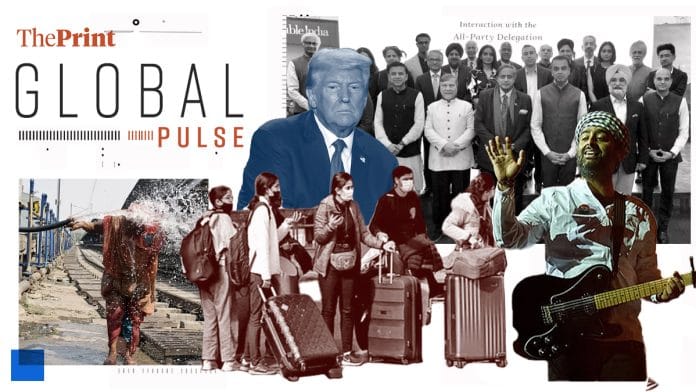New Delhi: US President Donald Trump’s sweeping reforms have hit another target—Indian students aspiring to study in the US.
The Trump administration’s decision to halt visa interviews for international students, an important demographic for US colleges, has Indian students riddled with anxiety, report Anupreeta Das and Pragati K.B. in The New York Times.
“Career counselors have become therapists, and the extended family networks that many Indians have in America—uncles and aunts who will often help finance the education of a niece or nephew—have set up war rooms online. Other students are revisiting their backup plans or rethinking their academic paths,” the report says.
Meanwhile, in the aftermath of the India-Pakistan conflict and Operation Sindoor, India has sent dozens of parliamentarians and diplomats into the rink in an attempt to wrest hold of the narrative. However, analysts and critics say it “underscores a sobering reality”, that the Modi government hasn’t received much support, reports Niha Masih in The Washington Post.
“A Western diplomat based in New Delhi, speaking on the condition of anonymity to discuss sensitive matters, said there are concerns over India’s lack of transparency, citing its reluctance to share evidence purportedly implicating Pakistan in the Kashmir attack or divulge information about its fighter jets lost in combat. If Indian officials are not more forthcoming, the diplomat said, their foreign charm offensive may prove fruitless,” states the report.
Beyond diplomacy, India is grappling with another kind of pressure, one that’s rising with the mercury.
If India fixes its pollution problem, it could exacerbate another yearly crisis––rising day-time temperatures. And so, the country needs to push for two things simultaneously: clean energy and more air-conditioners, notes The Economists’s Opinion newsletter.
“Investing in the grid and reforming the market for purchasing and distributing power would accelerate private-sector investment in renewables. And a faster roll-out of air-conditioning could be encouraged by lowering the tax on machines from 28%, the highest-available rate (Apple’s iPhones are charged just 18%). The government should lead by example, air-conditioning offices where citizens meet public servants, not just those of politicians and elite bureaucrats,” according to The Economist.
Meanwhile, for the founders of Panvira, a tech-centric hedge-fund, the country is now a hotbed of investment opportunity, similar to what Silicon Valley was in the 1990s, report Chris Kay and Arjun Neil Alim in The Financial Times.
“(Vaibhav) Singh and his co-founder Akhil Chainwala compared India’s tech sector to Silicon Valley in the 1990s and especially to China in 2005, when giants such as Alibaba were still young and funds such as Hillhouse had just launched to connect the local market with outside capital,” the report says.
“We do feel that the opportunities in India are big. We feel not just in terms of the 2005 China moment but also the late ’90s in the US,” Singh tells FT.
Panvira is “domiciled” in Gujarat’s gift city.
In an opportunity of a different nature, singer Arijit Singh is due to become the first Indian artist to play at a UK stadium, courtesy the cultural capital of the Indian diaspora, reports Ben Beaumont-Thomas in The Guardian. Other than Singh, the Tottenham Hotspur stadium in London is going to be frequented by artists like Beyonce and Kendrick Lamar this summer.
“A singer and multi-instrumentalist capable of hopping from a synth-laden dance banger to traditional Indian classical music, Singh has astounding technical ability, and his searching vocal lines have an emotional impact to stop you in your tracks,” reads a description of Singh.
(Edited by Zinnia Ray Chaudhuri)






